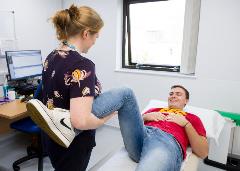The First Contact Physiotherapist (FCP) service for adults, 16 years and above, offers a fast and convenient musculoskeletal service at the GP surgery without having to see a GP first.
What is an FCP?
A First Contact Physiotherapist (FCP) is a healthcare professional working at an advanced clinical level with in-depth knowledge and experience of musculoskeletal (MSK) problems, who can provide clinical assessment, diagnosis, and a personalised management plan for patients with joint, muscular or nerve symptoms.
What do FCPs do?
- They provide thorough clinical assessments and diagnosis either in clinic or on the telephone.
- They provide evidence-based management plans of MSK conditions in line with NHS guidance, considering patients' preferences with treatment options to provide personalised self-management advice.
- They work closely with local NHS services and can refer onwards to MSK physiotherapy, Advanced Practice Physiotherapists, Orthopaedics, Rheumatology, Pain Management or Community Care.
- They can provide details of support services such as smoking cessation, weight management and community exercise programmes.
- They can refer for X-rays, ultrasound scans or blood tests if clinically indicated.
- They can provide ‘fitness for work’ notes as appropriate.
- Some FCPs offer corticosteroid injections for pain relief or prescribe specific medicines.
How can I make an appointment with an FCP?
Call your GP practice and if they have FCPs, ask for an FCP appointment.
If you need to discuss more than one problem, please request a double appointment. If this is not possible that day, another appointment can be arranged to assess the second problem/condition.
What are the benefits of FCPs?
- Quick and easy local access to MSK clinicians means less waiting time to see a specialist in MSK conditions, which promotes earlier management and provide personalised self-management advice.
- Early assessment allows patients to be screened for masquerading conditions presenting with MSK-like symptoms.

- If the patient’s symptoms are not physio-related, I.e. are due to a medical condition, rather than a MSK condition, then the patient can be directed to the most appropriate service or clinician.
- Most patients can be managed effectively with education and self-management advice on the first consultation. Therefore, preventing patients from developing chronic symptoms and having unnecessary investigations, which could delay their treatment.
- Can refer directly to other specialities including Orthopaedics and Rheumatology when appropriate, which means patients receive a streamlined pathway of care.
- Working closely alongside other medical professionals promotes communication and holistic patient care.
- Improving patients' health through referring to services to support smoking cessation, weight management and promote physical activity.
What is the difference between First Contact Physiotherapists (FCPs), Advanced Practice Physiotherapists (APPs) and MSK Physiotherapists?
- First Contact Physiotherapists (FCPs) work in GP clinics and have an in-depth knowledge and experience of musculoskeletal conditions. They are usually the first clinicians to assess, diagnose and offer early advice about an musculoskeletal (MSK) problem. They do not provide ongoing physiotherapy treatment but may refer the patient to the MSK physiotherapy team or the Advanced Practice Physiotherapists.
- Advanced Practice Physiotherapists (APPs) can complete further assessment or request investigations if clinically indicated. APPs are senior highly specialised physiotherapists and podiatrists with specialist clinical skills. APPs work closely with FCPs, MSK physiotherapists and orthopaedic surgeons.
- The MSK physiotherapy team are involved with assessing, treating, and supporting the progression of treatment for MSK conditions using a variety of treatment options.